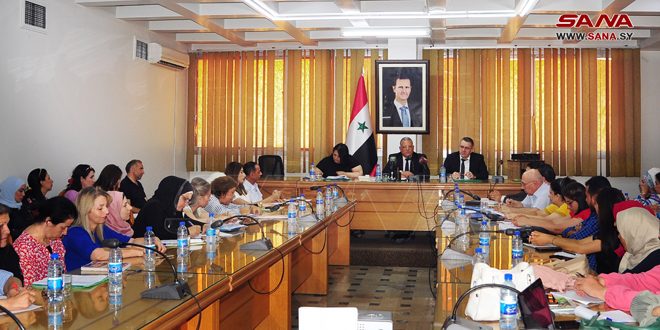On July 25th, the Ministry of Agriculture and Agrarian Reform discussed the administrative, financial and organizational foundations for the work of rural development departments, plant and animal food processing units, and markets for selling products of rural families in the governorates, and the mechanism for their development and operation.
The Minister of Agriculture, Eng. Mohamed Hassan Qatana, said that these units need to establish a legal, regulatory, administrative and financial framework that provides producers and rural residents with the opportunity to work in them properly and guarantee their rights.
Minister Qatana pointed to the importance of developing these production units to be development units capable of manufacturing a distinct rural product ( A specific brand) duly registered with government departments.
Minister Qatana pointed out that the manufacturing units and rural productive markets aim to market the rural product and help families manufacture it from the ingredients found in the countryside without the presence of any additives for unnatural materials.
The heads of departments in the governorates and the supervisors of manufacturing units and markets gave a presentation on the problems and difficulties that face the work.
Director of Rural Development in the Ministry, Dr. Raeda Ayoub, indicated that the purpose of the meeting is to identify problems and propose solutions to them so that the sales halls and units achieve the desired goals.
Ayoub said that 29 manufacturing units were established at the level of villages and in various governorates, the largest number was in the governorate of Lattakia, and 15 sales halls were opened, most of them in governorate centers andat the district level.
The Head of the Rural Development Department in the Lattakia Agriculture Directorate, Eng. Rabab Warda, said: “We have launched this project since 2019, and we have four manufacturing production units, namely the laurel soap manufacturing unit in Dalieh, the dairy, cheese, juice and confectionery manufacturing units in the Awamiya, and the flower and medicinal and aromatic plants manufacturing unit in Bassin, in addition to a multi-purpose unit in Al-Furnalq.”
Warda indicated that about 400 families benefit from these projects directly by marketing the products of the manufacturing units and the products of families with small businesses in the rural product sales halls.
O. al-Mohammad

